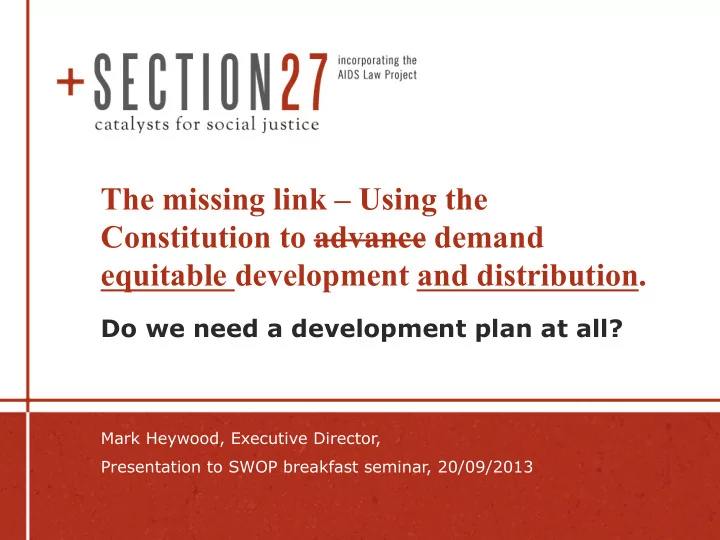

The missing link – Using the Constitution to advance demand equitable development and distribution. Do we need a development plan at all? Mark Heywood, Executive Director, Presentation to SWOP breakfast seminar, 20/09/2013
+ The Constitution: + Promise or compromise? + Supreme law? + Mandates for development + Regulating power + The NDP + is public policy + doesn't take advantage of the state’s constitutional power & risks delaying development + Dilutes rights to equality, dignity, food, basic education + Conclusion: towards an NDP based on constitutional mandates & active citizenship
Schools of thought on the Constitution Constitution as permission to challenge : + Vavi & Moosa: ‘The Constitution was not just written in the constituent assembly, it was + written in the prisons, in the struggles for freedom and equality, in the organisations built to conduct this struggle. The 1996 Constitution is a reflection of the wishes and demands of the people” Constitution as fatal compromise : + Ramathlodi: [the] Constitution reflects the great compromise, a compromise tilted heavily in + favour of forces against change.... In our case, the black majority enjoys empty political power while forces against change reign supreme in the economy, judiciary, public opinion and civil society.The old order has built a fortified front line in the mentioned forums. In the 17 years, we have witnessed sustained and relentless efforts to immigrate the little power left with the executive and the legislature to civil society and the judiciary. The main drivers in this process are the opposition and civil society, who feel relatively strong in those fronts, given the mainly still untransformed judiciary. Constitution as ambiguity : + Von Holdt: It is unclear how far the Constitution and the institutions it establishes are + adequate to facilitate redistribution since the ANC in government has hardly tested the possibilities. It has precluded such innovation through conservative policy choices (see other papers) shaped by internal developments, the pressures and inducements from business, international development institutions and ‘expertise’, and the constraints of global capitalism.
What the Constitution says about itself... We therefore, through our freely elected representatives, adopt this Constitution as the supreme law of the Republic so as to – + Heal the divisions of the past and establish a society based on democratic values, social justice and fundamental human rights; + Lay the foundations for a democratic and open society in which government is based on the will of the people and every citizen is equally protected by law; + Improve the quality of life of all citizens and free the potential of each person; and + Build a united and democratic South Africa able to take its rightful place as a sovereign state in the family of nations.
Regulating and directing power + Public + Private + Personal & social
Regulating public power s 195. Basic values and principles governing public administration + Public administration must be governed by the democratic values and principles enshrined in the + Constitution, including the following principles: A high standard of professional ethics must be promoted and maintained. + Efficient, economic and effective use of resources must be promoted. + Public administration must be development-oriented. + Services must be provided impartially, fairly, equitably and without bias. + People's needs must be responded to, and the public must be encouraged to participate in policy- + making. Public administration must be accountable. + Transparency must be fostered by providing the public with timely, accessible and accurate + information. Good human-resource management and career-development practices, to maximise human + potential, must be cultivated. Public administration must be broadly representative of the South African people, with employment + and personnel management practices based on ability, objectivity, fairness, and the need to redress the imbalances of the past to achieve broad representation. The above principles apply to - + administration in every sphere of government; + organs of state; and + public enterprises. + National legislation must ensure the promotion of the values and principles listed in subsection (1). +
Regulating private power + Horizontal application ... Reasonable legislative and other measures .. ... labour relations ... Property .. Environment ... Access to health care ... Access to housing
Guiding the exercise of power + What the Constitution has said about state duties: + Grootboom + Blue Moonlight + Glenister + Mazibuko + TAC
THE NDP
THE NDP IS PUBLIC POLICY + Cabinet has endorsed the objectives and 18 key targets
THE NDP DOESNT UNDERSTAND THE CONSTITUTION + Vision or obligation?
THE NDP COMPROMISES ON FUNDAMENTAL RIGHTS
InEquality The Plan proposes that the Gini co- efficient, will only decrease from its current world-beating level of 0,69% to an excessively high 0,6% by 2030. In terms of current measurements, 0,6 would still make our levels of inequality higher than any other major country in the world!
Right to sufficient food Prevalence ¡of ¡food ¡insecurity ¡ (experiencing ¡hunger) ¡by ¡province, ¡ SA ¡2012 (n=6115) 50 36.2 29.5 29.5 40 28.8 28.3 30.8 20.7 26.0 Percentage 30 19.2 16.4 20 NDP, offers only that “no one should suffer poverty induced hunger, thus no individual should live below the poverty line of R419 (2009).” (p 363) 10 0 Province
Basic Education “Many school environments are not conducive to learning.....” NDP Photos: SECTION27
Basic education: Census @ Schools, 2009: + 69% of schools had a maths teacher + Less than 25% had a library + Only 53% had a computer + 15% had access to email or the internet + In the community: 35% had access to a library, 31% access to a computer and 20% access to the internet
“active citizenry and social activism is necessary for democracy and development to flourish.”
Theory of change: progressive realisation of a minimum standard of living??
Advancing development through active citizenship + The right campaign for a cause + The right to strike + Access to courts
Active citizenship: The proof is in the pudding
Recommend
More recommend